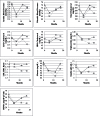Cardiometabolic risk after weight loss and subsequent weight regain in overweight and obese postmenopausal women
- PMID: 23183902
- PMCID: PMC3660120
- DOI: 10.1093/gerona/gls236
Cardiometabolic risk after weight loss and subsequent weight regain in overweight and obese postmenopausal women
Abstract
Background: Little is known about the effect of intentional weight loss and subsequent weight regain on cardiometabolic risk factors in older adults. The objective of this study was to determine how cardiometabolic risk factors change in the year following significant intentional weight loss in postmenopausal women, and if observed changes were affected by weight and fat regain.
Methods: Eighty, overweight and obese, older women (age = 58.8±5.1 years) were followed through a 5-month weight loss intervention and a subsequent 12-month nonintervention period. Body weight/composition and cardiometabolic risk factors (blood pressure; total, high-density lipoprotein, and low-density lipoprotein cholesterol; triglycerides; fasting glucose and insulin; and Homeostatic Model Assessment of Insulin Resistance) were analyzed at baseline, immediately postintervention, and 6- and 12-months postintervention.
Results: Average weight loss during the 5-month intervention was 11.4±4.1kg and 31.4% of lost weight was regained during the 12-month follow-up. On average, all risk factor variables were significantly improved with weight loss but regressed toward baseline values during the year subsequent to weight loss. Increases in total cholesterol, triglycerides, glucose, insulin, and Homeostatic Model Assessment of Insulin Resistance during the postintervention follow-up were significantly (p < .05) associated with weight and fat mass regain. Among women who regained weight, model-adjusted total cholesterol (205.8±4.0 vs 199.7±2.9mg/dL), low-density lipoprotein cholesterol (128.4±3.4 vs 122.7±2.4mg/dL), insulin (12.6±0.7 vs 11.4±0.7mg/dL), and Homeostatic Model Assessment of Insulin Resistance (55.8±3.5 vs 50.9±3.7mg/dL) were higher at follow-up compared with baseline.
Conclusions: For postmenopausal women, even partial weight regain following intentional weight loss is associated with increased cardiometabolic risk. Conversely, maintenance of or continued weight loss is associated with sustained improvement in the cardiometabolic profile.
Keywords: Aging.; Weight loss; Weight regain.
Figures


References
-
- Flegal KM, Carroll MD, Kit BK, Ogden CL. Prevalence of obesity and trends in the distribution of body mass index among US adults, 1999-2010. JAMA. 2012; 307: 491–497 - PubMed
-
- Pérez JA, Garcia FC, Palacios S, Pérez M. Epidemiology of risk factors and symptoms associated with menopause in Spanish women. Maturitas. 2009; 62: 30–36 - PubMed
-
- Schenck-Gustafsson K. Risk factors for cardiovascular disease in women. Maturitas. 2009; 63: 186–190 - PubMed
-
- Rexrode KM, Hennekens CH, Willett WC, et al. A prospective study of body mass index, weight change, and risk of stroke in women. JAMA. 1997; 277: 1539–1545 - PubMed

